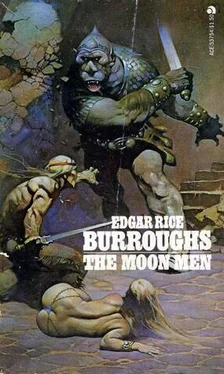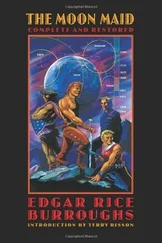Edgar Burroughs - The Moon Men
Здесь есть возможность читать онлайн «Edgar Burroughs - The Moon Men» весь текст электронной книги совершенно бесплатно (целиком полную версию без сокращений). В некоторых случаях можно слушать аудио, скачать через торрент в формате fb2 и присутствует краткое содержание. Жанр: Боевая фантастика, на английском языке. Описание произведения, (предисловие) а так же отзывы посетителей доступны на портале библиотеки ЛибКат.
- Название:The Moon Men
- Автор:
- Жанр:
- Год:неизвестен
- ISBN:нет данных
- Рейтинг книги:3 / 5. Голосов: 1
-
Избранное:Добавить в избранное
- Отзывы:
-
Ваша оценка:
- 60
- 1
- 2
- 3
- 4
- 5
The Moon Men: краткое содержание, описание и аннотация
Предлагаем к чтению аннотацию, описание, краткое содержание или предисловие (зависит от того, что написал сам автор книги «The Moon Men»). Если вы не нашли необходимую информацию о книге — напишите в комментариях, мы постараемся отыскать её.
The Moon Men
The Moon Men — читать онлайн бесплатно полную книгу (весь текст) целиком
Ниже представлен текст книги, разбитый по страницам. Система сохранения места последней прочитанной страницы, позволяет с удобством читать онлайн бесплатно книгу «The Moon Men», без необходимости каждый раз заново искать на чём Вы остановились. Поставьте закладку, и сможете в любой момент перейти на страницу, на которой закончили чтение.
Интервал:
Закладка:
The commander of the guard had been stationed here for years and we considered ourselves very fortunate in that he was too lazy and indolent to be cruel or oppressive. His tax collectors were always with us on market days; but they did not exact so much that we had nothing left for ourselves as refugees from Milwaukee told us was the case there.
I recall one poor devil from Milwaukee who staggered into our market place of a Saturday. He was nothing more than a bag of bones and he told us that fully ten thousand people had died of starvation the preceding month in his Teivos. The word Teivos is applied impartially to a district and to the administrative body that misadministers its affairs. No one knows what the word really means, though my mother has told me that her grandfather said that it came from another world, the moon, like Kash Guard, which also means nothing in particular-one soldier is a Kash Guard, ten thousand soldiers are a Kash Guard. If a man comes with a piece of paper upon which something is written that you are not supposed to be able to read and kills your grandmother or carries off your sister you say: “The Kash Guard did it.”
That was one of the many inconsistencies of our form of government that aroused my indignation even in youth-I refer to the fact that the Twenty-Four issued written proclamations and commands to a people it did not allow to learn to read and write, I said, I believe, that printing was a lost art. This is not quite true except as it refers to the mass of the people, for the Twenty-Four still maintained a printing department, where it issued money and manifestos. The money was used in lieu of taxation-that is when we had been so over-burdened by taxation that murmurings were heard even among the Kalkar class the authorities would send agents among us to buy our wares, paying us with money that had no value and which we could not use except to kindle our fires.
Taxes could not be paid in money as the Twenty-Four would only accept gold and silver, or produce and manufactures, and as all the gold and silver had disappeared from circulation while my father was in his teens we had to pay with what we raised or manufactured.
Three Saturdays a month the tax collectors were in the market places appraising our wares and on the last Saturday they collected one per cent of all-we had bought or sold during the month. Nothing had any fixed value-to-day you might haggle half an hour in trading a pint of beans for a goat skin and next week if you wanted beans the chances were more than excellent that you would have to give four or five goat skins for a pint, and the tax collectors took advantage of that-they appraised on the basis of the highest market values for the month.
My father had a few long haired goats-they were called Montana goats, but he said they really were Angoras, and mother used to make cloth from their fleece. With the cloth, the milk and the flesh from our goats we lived very well, having also a small vegetable garden beside our house; but there were some necessities that we must purchase in the market place. It was against the law to barter in private, as the tax collectors would then have known nothing about a man’s income. Well, one winter my mother was ill and we were in sore need of coal to heat the room in which she lay, so father went to the commander of the Kash Guard and asked permission to purchase some coal before market day. A soldier was sent with him to Hoffmeyer, the agent of the Kalkar, Pthav, who had the coal concession for our district-the kalkers have everything-and when Hoffmeyer discovered how badly we needed coal he said that for five milk goats father could have half his weight in coal.
My father protested, but it was of no avail and as he knew how badly my mother needed heat he took the five goats to Hoffmeyer and brought back the coal. On the following market day he paid one goat for a sack of beans equal to his weight and when the tax collector came for his tithe he said to father: “You paid five goats for half your weight in beans, and as everyone knows that beans are worth twenty times as much as coal, the coal you bought must be worth one hundred goats by now, and as beans are worth twenty times as much as coal and you have twice as much beans as coal your beans are now worth two hundred goats, which makes your trades for this month amount to three hundred goats. Bring me, therefore, three of your best goats.”
He was a new tax collector-the old one would not have done such a thing; but it was about that time that everything began to change. Father said he would not have thought that things could be much worse; but he found out differently later. The change commenced in 2017, right after Jarth became Jemadar of the United Teivos of America. Of course, it did not all happen at once. Washington is a long way from Chicago and there is no continuous railroad between them. The Twenty-Four keeps up a few disconnected lines; but it is hard to operate them as there are no longer any trained mechanics to maintain them. It never takes less than a week to travel from Washington to Gary, the western terminus.
Father said that most of the railways were destroyed during the wars after the Kalkars overran the country and that as workmen were then permitted to labor only four hours a day, when they felt like it, and even then most of them were busy making new laws so much of the time that they had no chance to work, there was not enough labor to operate or maintain the roads that were left, but that was not the worst of it. Practically all the men who understood the technical details of operation and maintenance, of engineering and mechanics belonged to the more intelligent class of earthmen and were, consequently, immediately thrown out of employment and later killed.
For seventy-five years there had been no new locomotives built and but few repairs made on those in existence. The Twenty-Four had sought to delay the inevitable by operating a few trains only for their own requirements-for government officials and troops; but it could now be but a question of a short time before railroad operation must cease-forever. It didn’t mean much to me as I had never ridden on a train-never even seen one, in fact, other than the rusted remnants, twisted and tortured by fire, that lay scattered about various localities of our city; but father and mother considered it a calamity-the passing of the last link between the old civilization and the new barbarism.
Airships, automobiles, steamships, and even the telephone had gone before their time; but they had heard their fathers tell of these and other wonders. The telegraph was still in operation, though the service was poor and there were only a few lines between Chicago and the Atlantic seaboard. To the west of us was neither railroad nor telegraph. I saw a man when I was about ten years old who had come on horseback from a Teivos in Missouri. He started out with forty others to get in touch with the east and learn what had transpired there in the past fifty years; but between bandits and Kash Guards all had been killed but himself during the long and adventurous journey.
I shall never forget how I hung about picking up every scrap of the exciting narrative that fell from his lips nor how my imagination worked overtime for many weeks thereafter as I tried to picture myself the hero of similar adventures in the mysterious and unknown west. He told us that conditions were pretty bad in all the country he had passed through; but that in the agricultural districts living was easier because the Kash Guard came less often and the people could gain a fair living from the land. He thought our conditions were worse than those in Missouri and he would not remain, preferring to face the dangers of the return trip rather than live so comparatively close to the seat of the Twenty-Four.
Father was very angry when he came home from market after the new tax collector had levied a tax of three goats on him. Mother was up again and the cold snap had departed leaving the mildness of spring in the late March air. The ice had gone off the river on the banks of which we lived and I was already looking forward to my first swim of the year. The goat skins were drawn back from the windows of our little home and the fresh, sun-laden air was blowing through our three rooms.
Читать дальшеИнтервал:
Закладка:
Похожие книги на «The Moon Men»
Представляем Вашему вниманию похожие книги на «The Moon Men» списком для выбора. Мы отобрали схожую по названию и смыслу литературу в надежде предоставить читателям больше вариантов отыскать новые, интересные, ещё непрочитанные произведения.
Обсуждение, отзывы о книге «The Moon Men» и просто собственные мнения читателей. Оставьте ваши комментарии, напишите, что Вы думаете о произведении, его смысле или главных героях. Укажите что конкретно понравилось, а что нет, и почему Вы так считаете.








